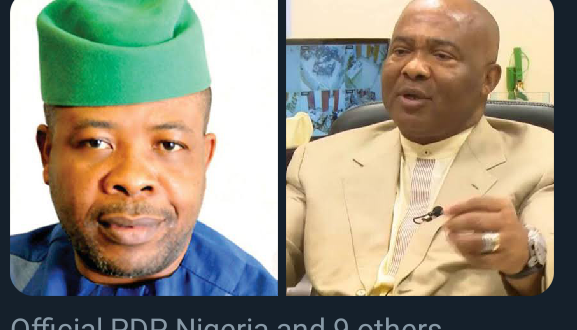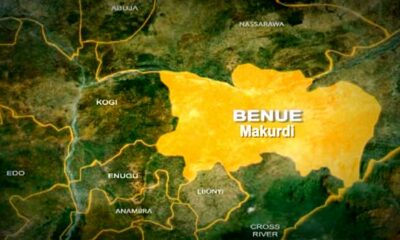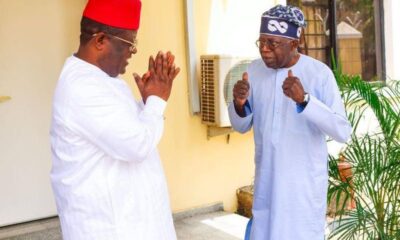Latest News
Imo: Why Supreme Court judgement should be fully ‘interrogated’

By: MIKE OZEKHOME SAN, OFR
INTRODUCTION
Nigerians have been worried and saddened by the Supreme Court decision in Hope Uzodinma v. Emeka Ihedioha. They cannot simply understand the judgment. There is ordinarily a presumption by the society that the Supreme Court, being the final court of the land, is supposed to be right in its decisions, after rigorous and painstaking perusal of cases brought before it between feuding parties.
However, the next stage is for legal pundits, analysts and academicians, to dissect the judgment thoroughly, to decipher if it met the justice of the case, having regard to the available facts. They must interrogate whether the judgment actually delivered justice according to law.
After all, law is but a handmaid instituted by man to deliver justice. The two are siamese twins. One without the other is bare and vacuous. One area that needs critical analysis and interrogation is what makes a candidate that came 4th in an election to be declared the winner of that election.
LET US SEE HOW SUPREME COURT JUSTIFIED ITS DECISION
According to the court, with the results from 388 polling units, Sen. Uzodinma polled a majority of the lawful votes and ought to have been declared the winner of the election by the Independent National Electoral Commission (INEC).The new tabulation therefore voided and set aside the declaration of Mr Ihedioha as the winner of the march 9th 2019, governorship election. Remember that there was concurrent finding of facts by both the Election Petition Tribunal and the Court of Appeal. But, the Supreme Court held that:
“Votes due to the appellant, senator Hope Uzodinma and the APC from the 388 polling units were wrongly excluded from scores ascribed to the appellant. It is thereby ordered that the appellant votes from the 388 polling units unlawfully excluded from the appellant votes declared shall be added and that the first respondent, Mr Emeka Ihedioha, was not duly elected by a majority of lawful votes cast at the said election.”
The apex court went further to add that:
“He (Emeka Ihedioha’s) return as the elected governor of Imo state is hereby declared null and void and accordingly set aside. It is hereby declared that the certificate of Return shall be issued to the first appellant, Sen. Hope Uzodinma, forthwith and he should be sworn in as the governor of Imo State.”
While explaining that the lower courts erred to have rejected the results of the 388 polling units on the ground that they were not tendered before the court by the proper person, the learned justice said:
“P54, a police officer who tendered the result was subpoenaed to produce the results, it was wrong for the lower courts to hold that P54 was not the proper person to tender the results.”
WAS THE DECISION IN LINE WITH EARLIER PRECEDENTS?
The Supreme Court as the apex court of the nation is constitutionally and legally bound to give adequate reasons as to why and they arrived at their decisions. It is obvious from the judgement of the apex court that the reasons given run contrary to their earlier decisions, especially Atiku v Buhari & Ors (2019). The Supreme Court had always maintained that to prove exclusion or over voting, evidence from each polling unit involved must be produced and witnesses called from all such affected polling units.
In the case of Atiku v. Buhari & Ors (supra), the Supreme Court consistently decided that for a petitioner to succeed in an allegation of infraction of any provision of the Electoral Act, especially one complaining about malpractices or wrongful exclusion of votes, the petitioner must call witnesses polling unit by polling unit.
Now, a Police Officer, one Rabiu Huseini, (a Deputy Police Commissioner) who was in charge of operations on the day of election and WHO WAS NOT EVEN PRESENT AT THE VENUES AT ALL, was subpoenaed by the Tribunal to give evidence. His evidence formed the very basis of the decision of the Supreme Court. The Petitioner called just one witness and the Apex Court based its decision on this sole witness evidence. The evidence brought by the Police Officer was not even verified or interrogated by the Supreme Court. Yet, it accepted the fact that because the witness was subpoenaed, then his evidence must be presumed to be true.
The question that the Apex Court failed to address its learned mind to was, ‘where did Mr Hope Uzodinma get those forms EC 8A, which were not tendered by INEC, from, having been merely tendered through a Policeman? Did the affected polling units not have presiding officers and party agents? Why is it that it is a witness who was never even present at the polling units that was called to give evidence in such a sensitive matter?
Section 121(a) of the Evidence act 2011 provides that a:
“fact is said to be proved when after considering the matters before it, the court either believes it to exist or considers its existence so probable that a prudent man ought, in the circumstances of the particular case, to act upon the supposition that it does not exist.”
Elections are normally conducted at polling units. It is only from such polling units that ingredients of proof or otherwise of matters complained about should be generated. Such evidence is elicited from human beings who witnessed the matters. The Police Officer witness was himself not present at the 388 polling units when election was going on.
Section 179 (2) of the Constitution of the Federal Republic of Nigeria, 1999 (as amended) provides that:
“A candidate for an election to the office of Governor of a state shall be deemed to have been duly elected where, there being two or more candidates:
a. He has the highest number of votes cast at the election, and
b. He has not less than one quarter of all the votes cast in each of at least two-thirds of all the local government areas of the state”.
Another area that needs critical analysis and interrogation is what makes a candidate that came fourth in an election to be declared the winner of that election?
From the Imo State election, the Independent National Electoral Commission had declared the results of the candidates as follows:
Emeka Ihedioiha had 273, 404 votes. Uche Nwosu, candidate for Action Alliance (AA) had 190, 364 votes. Ifeanyi Ararume, candidate for All Progressive Grand Alliance (APGA) had 114, 676 votes. Hope Uzodinma of the All Progressive Congress (APC) had 96, 458 votes. Now, these are the candidates who had petitioned the result of the election against Emeka Ihedioha. There are however several other candidates whose names were not even mentioned at all, but nevertheless secured some votes. The Supreme Court held that the 388 polling unit results that were cancelled when calculated, amounted to 213, 695 votes. When all the results were added, including the new number declared by the Supreme Court, all the votes went up to about 888, 617 (excluding the candidates whose names were not mentioned at all).
This would therefore become a clear case of over-voting if we go by the Supreme Court’s earlier decisions and the provisions of Electoral Act which in Section 53 provides:
1. No voter shall vote more than one candidate or record more than one vote in favour of any candidate at any election.
2. Where the votes cast at an election in any polling unit exceed the number of registered votes in that polling unit, the result of the election may be conducted at a date to be fixed by the Commission where the result of that polling unit may affect the overall result in the constituency”.
It is therefore a matter of great surprise that the Supreme Court never resorted to the above provisions of the law before arriving at their controversial decision. Justice must not only be done, but must be seen to have been done. To say Nigerians are angry is an understatement. It is quite troubling for the Supreme Court, which is the Apex Court of the land, to arrive at a decision like this. This is great embarrassment to the nation. This is why Nigerians are very angry. They wonder why we can no longer predict our judgments with minimal accuracy based on laid down judicial precedents.
Another area that requires an urgent answer is why INEC has failed the nation that Presidents and Governors are now being packaged in the dark recesses and hallowed Chambers of courts and delivered for the country and states, against the clear choice of the electorate at the polls.
If INEC had gotten its acts right, the present conundrum and Judiciary’s frequent interventions in electoral disputes would have been greatly minimized. Today, INEC is neither truly independent, impartial, nor well equipped to count the electorate’s votes and also ensure that such votes actually count. That is the sorry state we are in today, especially since 2015. May God help Nigeria.
“Winning or losing of the election is less important than strengthening the country.” (Indira Gandhi).
LAST LINE
I thank Nigerians for always keeping faith with the Sunday Sermon on the Mount of the Nigerian Project, by Chief Mike Ozekhome, SAN, OFR, FCIArb., Ph.D, LL.D. I enjoin you to look forward to next week’s treatise.




















